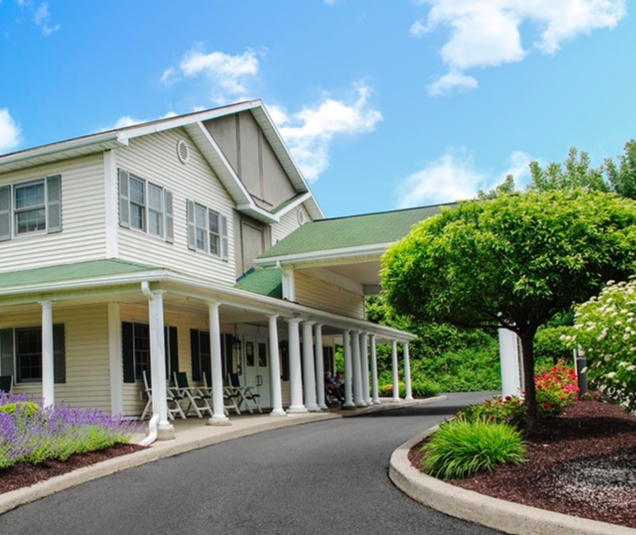Transitioning a loved one into long-term or short-term care doesn’t mean cutting off their connection to the outside world. Rather, it’s about providing them with the appropriate level of support and care to maintain and encourage their independence while still helping them thrive in a social, welcoming community.
Most residents can leave for day trips, but levels of mobility and independence vary from person to person. Speak to your loved one’s care staff to understand what’s suitable for them.
Our residents’ safety is the top priority. That’s why we have sign-out/sign-in procedures in place. Our staff can guide you through this process and walk you through anything you may need to consider for the well-being of your loved one while you enjoy this excursion.
There’s usually no rule on how often you can take your loved one out, provided your trips fit with their health and overall care plan.
We encourage you to plan a day out with your loved one! It’s an opportunity to bring them joy, have something to look forward to, and enhance their overall well-being.
How Visiting Loved One Benefits Our Residents
Planning a day outing can remind your loved one of the meaningful relationships and moments existing beyond community walls.
Here’s how day visits can make a positive difference.
Emotional Enrichment
A change of pace can be revitalizing for everyone. Leaving the familiarity of community living, even for just a few hours, refreshes the spirit.
A simple trip to your family’s home, a picnic in the park, or a drive to their favorite café can spark conversation, laughter, and cherished memories. This break from their routine brings a sense of normalcy and reminds them how valued they are in your life.
Strengthen Relationships
Nurturing the bond you share with your loved one requires time, attention, and effort. Taking the time to spend uninterrupted quality time together strengthens that connection.
Whether you’re sharing a home-cooked meal or looking through old family photo albums, these moments lead to meaningful conversations and help deepen your understanding of their needs and feelings.
Boost Overall Wellness
Research shows that meaningful social connections and activities significantly support overall wellness by enhancing cognitive function, reducing feelings of isolation, and improving physical health.
No matter the intent or simplicity of your outing, these brief moments can go a long way in making your loved one feel appreciated while fostering overall wellness.
Things to Consider for Your Day Plans
While these day plans are rewarding, a little preparation goes a long way to confirming a positive experience for everyone involved.
Here’s what you should consider when planning an outing with your loved one living in a supportive care community
Discuss the Plan with Staff Members
You can never go wrong with planning ahead.
Always start by speaking with the staff in your loved one’s community. They can provide insights into your loved one’s health, mobility, and any special needs to consider.
They’ll also inform you of any procedures you might need to follow, such as signing them out or confirming their medication schedule.
Comfort Level
Plan an outing that aligns with your loved ones’ abilities and energy levels. If they use a mobility aid such as a walker or wheelchair, choose an accessible destination.
Choose an activity at a pace they’re comfortable with, whether it’s a walk in the park, a quiet lunch at home, or an afternoon or family time.
Pack essentials like water, snacks, any medications they may need, or a lightweight blanket for added comfort during travel.

Choose Familiar Environments
Familiarity creates comfort.
If your loved one is experiencing a form of cognitive decline, their memory retention may not be as sharp as it once was. Visiting familiar places, such as their old neighborhood, a relative’s house, or favorite care, can evoke positive memories and reduce feelings of anxiety.
Calm, quiet environments aren’t as overstimulating. An environment with limited distractions can go a long way toward making them relaxed, comfortable, and engaged in your company or activity.
Respect their Daily Routine
Be mindful of your loved one’s routine. Although a daily break from the expected can be exciting, many older adults, especially those with cognitive decline, find comfort and safety in a daily care plan.
Besides, many older adults are more alert and energized earlier in the day or after breakfast. Avoid planning activities late in the day, as fatigue can start setting in.
Always prioritize their routine and try to work around this. Be mindful of their usual meal, nap, or medication times to maintain a sense of continuity and keep disruptions to a minimum.
Prepare for Conversations & Activities
Going to a physical location is just one part of the equation. Have a rough idea of what you’d like the focus of your time to look like.
Think about an activity you and your loved one would enjoy during the visit. It may be as simple as watching their favorite movie, going on a light walk, or cooking a meal together. Incorporate photos, trinkets, or small items that may spark memories, joy, or conversations.
However, be prepared for flexibility. Some older adults are particular in their routine, and their energy and mood will vary daily. Perhaps they’re having a rough day and want to spend most days indoors, doing a simple and comfortable activity.
And that’s okay! While planning is great, don’t be discouraged if you have to make adjustments.
At the end of the day, meaningful, low-pressure activities provide an opportunity to share experiences to make the day more memorable.
Create Joyful Memories
We encourage our residents to spend the day with their families and loved ones, even if it means leaving their community for a day. It’s an opportunity to create joyful moments, strengthen relationships, and support your loved one’s well-being.
As much as they cherish these moments with you, they greatly benefit from the care and companionship they receive within their community.
Connect with our Peregrine Senior Living at Shaker team to learn more about the benefits of living in a supportive community environment.












Learn and experience insider tips, considerations and real guidance that only experts can provide in person! ... See MoreSee Less
Thank you to Cheriene from Marquis Home Care for joining us for a corn hole tournament and bringing refreshments! ... See MoreSee Less
You can now find our March activities calendar online.
These calendars are still printed and available throughout the community and are posted.
Click on the link below to view this month’s calendar!
Assisted Living: illst.us/7DY159
Memory Care: illst.us/538D0F ... See MoreSee Less
Dining at our community is about more than what’s on the plate—it’s about connection, community, and the joy of gathering together.
Our talented culinary team crafts meals that are both delicious and nutritious, offering flavors that comfort and inspire.
From themed dinners to chef demonstrations, each meal becomes an opportunity to savor the moment and celebrate life’s simple pleasures. 🍴
peregrineshaker.com/ ... See MoreSee Less
At Peregrine Shaker we are always up for trying something new. This week we started a wine tasting series. We started off with Chardonnay! We learned about how this wine is made and about the grapes that give it the distinct taste. Everyone enjoyed the tasting experience. Which wine should we try next? ... See MoreSee Less
We welcome surprise visits. Our friend Maple Syrup dropped by for a visit today. ... See MoreSee Less
Today we celebrate the caregivers—those whose quiet strength and unwavering compassion bring comfort to so many.
We see the difference caregivers make every day: holding a hand, sharing a smile, or offering reassurance when it’s needed most. 💕
Your dedication reminds us that true care goes beyond tasks—it’s an act of love, patience, and humanity.
Thank you for all you do to make the world a more compassionate place.
peregrineshaker.com/ ... See MoreSee Less